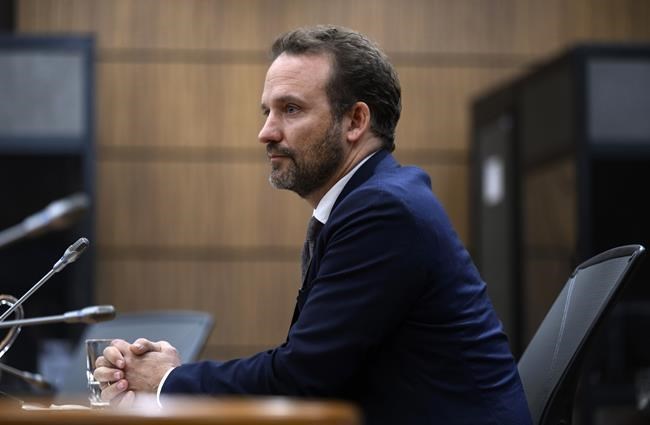OTTAWA — The prime minister's brother insisted to members of Parliament on Wednesday that the Pierre Elliott Trudeau Foundation has not been part of any foreign interference attempts by China, as the organization continues to be dogged by questions about controversial donations.
Alexandre Trudeau, who has been involved in the foundation since its early days and was an executive director until 2020, said the donations from Chinese businessmen were negotiated before his brother became prime minister.
"I must insist there was no foreign interference, no possibility of interference, no intention or means of interference at or in the Trudeau Foundation," he told the House of Commons ethics committee.
"This is a waste of time."
The committee is investigating the circumstances around a pair of 2016 and 2017 donations from Chinese billionaire Zhang Bin and another Chinese businessman, Niu Gensheng, that totalled $140,000.
The Globe and Mail had reported in February, citing an unnamed source, that the donors appeared to offer the money in the hopes of influencing the new Liberal leader ahead of a federal election in which he might defeat the ruling Conservatives.
Prime Minister Justin Trudeau has repeatedly said that it has been about a decade since he had any involvement with the foundation.
Alexandre Trudeau volunteered to appear before the committee to dispel what he called misinformation, affirming that he does not discuss "public affairs" with his brother and they did not speak in the run-up to his testimony.
Trudeau said talks with the Université de Montréal about a donation intended to honour his father began in December 2013, "a long way from any notion of a Trudeau government, or even a Trudeau Opposition leader."
At the time, the Conservatives were the governing party, with the New Democrats serving as the official Opposition.
Morris Rosenberg, who was appointed as the foundation's CEO in 2014, told the committee on Tuesday that the negotiations were finalized in 2015 prior to the election that saw Justin Trudeau ascend to power.
The donations had been made in tandem with a $750,000 contribution to the Université de Montréal.
Reports by Quebec-based newspaper Le Devoir suggest that, according to people involved in the negotiations at the university, the donors intended for all of the money to go toward the school.
Alexandre Trudeau said Zhang had previously donated $800,000 to the University of Toronto and was "excited' to broker a similar deal with Université de Montréal.
He said after the foundation was approached by Université de Montréal in 2013, Zhang seemed "a little irked" that the charitable organization was suddenly involved.
"He was friendly, but not overly so," Trudeau told the committee, adding that he was not directly involved in the negotiations.
Trudeau defended the fact that his signature appeared on a cheque used to make the donation, saying he had signing authority at the foundation and he felt it was appropriate to play that role for a gift that was intended to honour his father.
The donations were also aimed at trying to get "Chinese students exposed to Canadian ways," he said.
Trudeau argued that Zhang is a well-known philanthropist and said he doesn't believe the billionaire was part of some elaborate plan to influence the prime minister. "As far as I'm concerned, he's an honourable man."
Doing business with China in 2016 was not as controversial as it is in 2023, Trudeau added: "Things have changed."
Rosenberg, who was a deputy minister of foreign affairs under Stephen Harper's Conservative government from 2010 to 2013, made a similar point during his testimony on Tuesday.
He said that in retrospect, the foundation and other Canadian organizations were naïve to think they could have "soft-power influence on China" during a push to establish such connections at the time.
Rosenberg said the Université de Montréal thought that exposing Chinese people to "our way of life, our rule of law" would affect China through osmosis.
"I don't think we saw the current regime coming, and it took a while to change our mind," he said.
Trudeau, who has built a career as a documentary filmmaker, declined to speak to media prior to his testimony on Wednesday.
He arrived at the committee room and sat in the witness chair about 40 minutes before the meeting began, at one point talking to the committee clerk about where the cameras in the room were.
On Wednesday, the prime minister said he hadn't talked to his brother for several weeks.
"I think that my brother will be able to explain very well what happened and his perspective, and people will see very clearly that on the subject of the Trudeau Foundation, I have not had direct or indirect engagement for many years," he told reporters on French.
This report by The Canadian Press was first published May 3, 2023.
Mickey Djuric, The Canadian Press

